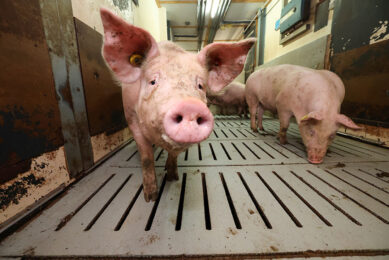Boar taint vaccination: no impact on behaviour
The behaviour of male pigs, vaccinated against boar taint, does not create extra problems in the fattening period, when compared to surgically castrated pigs.
The study into fattenening pigs was published in Applied Animal Behaviour Science.
In the Austrian/German research, carried out by scientists from the University of Veterinary Medicine Vienna, the University of Leipzig, a veterinary practice and Pfizer Animal Health, the male vaccinated pigs were housed in single sex groups of 12 individuals – and their behaviour was compared to conventionally castrated pigs, without the use of anaesthetics.
The two-shot vaccine, containing a gonadotropin releasing factor (GnRF), suppresses the development of the hormones androsthenone and skatole, both identified as the major causes for the development of boar taint in pigs. The vaccine is produced and marketed as Improvac.
Data collection
Data collection took place in a commercial German fattening unit. Each treatment comprised eight groups of 12 pigs. Data on postures were scored from 24-hour videos recorded in every week of the fattening period (16 weeks) using scan sampling with five minute intervals.
Social behaviour was analysed in weeks 2, 4, 6, 8, 10, 12, 14, 15 and 16 by continuous behaviour recording of focus animals in four blocks of two©hours phased evenly during the day. Overall, during the whole fattening period, vaccinates were more active than surgical castrates, indicated by a higher proportion of pigs standing.
Significant decrease
Vaccinated animals showed a significant decrease in standing and an increase of sitting and lying after the second vaccination. No significant effects of treatment on the total number of agonistic interactions and on biting and fighting were found.
In the vaccinated group, the prevalence of aggressive behaviours decreased after the second vaccination, which was not found in the group with non-castrated animals during the same period.
Vaccinated animals showed a higher level of mounting behaviour compared with non-vaccinated animals, but on a very low level. Treatment had no effect on the prevalence of play behaviour and manipulating of penmates.
Related websites:
• Applied Animal Behaviour Science
• Pfizer Animal Health©
• University of Veterinary Medicine Vienna
• University of Leipzig











